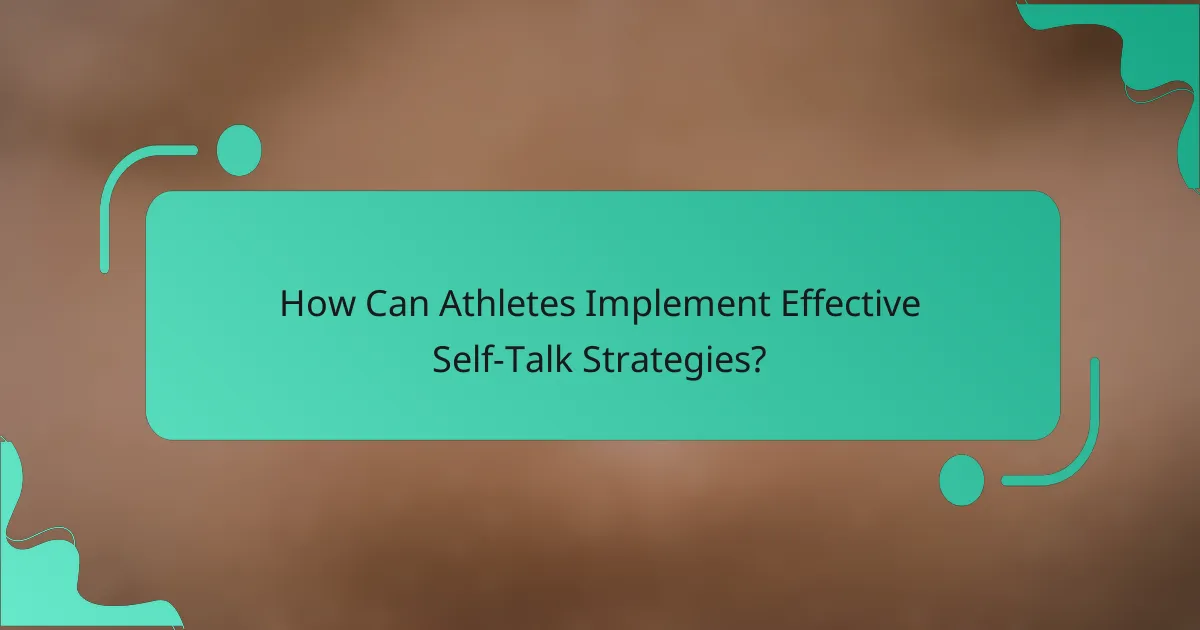Athletes often face challenges in maintaining focus, confidence, and resilience during competition. Psychological strategies like self-talk can significantly enhance performance by reducing anxiety and boosting motivation. This article explores the attributes of effective self-talk, including specificity and positivity, as well as rare techniques like self-compassion and emotional regulation. Additionally, it outlines practical strategies such as positive affirmations and mindfulness to optimize mental clarity and resilience.

How Does Self-Talk Influence Athletic Performance?
Self-talk significantly enhances athletic performance by improving focus, confidence, and resilience. Positive self-talk can lead to better outcomes in training and competition. Research shows that athletes who engage in constructive self-talk experience reduced anxiety and heightened motivation, resulting in improved performance metrics. For instance, a study found that athletes using positive affirmations outperformed those who did not. By mastering self-talk, athletes can create a mental environment conducive to success, ultimately influencing their overall performance.
What are the key components of effective self-talk?
Effective self-talk involves positive affirmations, constructive feedback, and focus on goals. Key components include self-awareness to recognize negative thoughts, reframing those thoughts into positive statements, and maintaining a growth mindset. Research shows that athletes who practice effective self-talk enhance their performance and resilience. By consistently using these strategies, athletes can improve focus and reduce anxiety during competition.
How can self-talk enhance focus during competitions?
Self-talk can significantly enhance focus during competitions by promoting a positive mindset and reducing anxiety. Athletes using constructive self-talk experience improved concentration, which leads to better performance outcomes. Research indicates that specific phrases can help maintain focus on goals and strategies, allowing athletes to perform at their peak. Furthermore, using self-talk to reinforce confidence can create a unique psychological advantage, fostering resilience against distractions.
What role does self-talk play in building resilience?
Self-talk significantly enhances resilience by shaping athletes’ mental frameworks. Positive self-talk fosters confidence, reduces anxiety, and promotes focus during challenges. Research shows that athletes who engage in constructive self-dialogue experience improved performance under pressure. This psychological strategy enables them to reframe setbacks as learning opportunities, ultimately strengthening their mental fortitude.
What are common self-talk strategies used by pro athletes?
Pro athletes commonly use self-talk strategies to enhance focus and performance. These strategies include positive affirmations, visualization techniques, and reframing negative thoughts. Positive affirmations involve repeating encouraging phrases to boost confidence. Visualization techniques allow athletes to mentally rehearse successful performances. Reframing negative thoughts helps transform doubts into motivating challenges. Each strategy contributes to improved resilience and mental clarity during competitions.
How can athletes identify negative self-talk patterns?
Athletes can identify negative self-talk patterns by monitoring their thoughts during training and competition. Recognizing phrases that undermine confidence, such as “I can’t” or “I’m not good enough,” is crucial. Journaling these thoughts can reveal recurring themes. Additionally, seeking feedback from coaches or peers can provide insights into self-perception. Mindfulness techniques, like meditation, help increase awareness of negative self-talk, allowing athletes to replace it with positive affirmations. This process enhances mental resilience and overall performance.

What Unique Attributes Define Self-Talk for Pro Athletes?
Self-talk for pro athletes is defined by its unique attributes: specificity, positivity, and immediacy. Specificity refers to tailored affirmations that address individual performance aspects. Positivity emphasizes constructive language that boosts confidence. Immediacy involves real-time self-talk during competition to enhance focus and resilience. These attributes collectively foster an optimal mental state for peak performance.
How does self-talk differ across various sports?
Self-talk varies significantly across sports, influenced by the psychological demands of each discipline. In team sports like football, self-talk often focuses on collaboration and motivation, enhancing team dynamics. Conversely, individual sports such as tennis emphasize self-encouragement and focus to manage pressure.
Athletes in combat sports, like boxing, utilize self-talk to boost aggression and resilience, while endurance athletes, such as marathon runners, may employ calming self-talk to maintain focus over long distances. The effectiveness of self-talk strategies can also depend on the athlete’s experience and the specific challenges posed by their sport.
What unique challenges do pro athletes face in managing self-talk?
Pro athletes face unique challenges in managing self-talk, including intense pressure, high expectations, and the need for constant motivation. These factors can lead to negative self-talk, impacting performance and mental health. Athletes often struggle with maintaining a positive internal dialogue amidst criticism and setbacks. Additionally, the competitive environment can amplify self-doubt, making it crucial for athletes to develop effective psychological strategies. Techniques such as visualization and affirmations can help counteract negative thoughts, fostering resilience and focus.
What specific techniques do elite athletes use to optimize self-talk?
Elite athletes use techniques like positive affirmations, visualization, and focused breathing to optimize self-talk. These strategies enhance confidence, maintain concentration, and build resilience during competition.
Positive affirmations involve repeating encouraging phrases to foster a constructive mindset. Visualization allows athletes to mentally rehearse successful performances, which can improve execution. Focused breathing helps regulate emotions, reducing anxiety and enhancing clarity.
Research indicates that consistent application of these techniques leads to improved performance metrics, such as reaction times and endurance levels. By mastering self-talk, athletes create a mental environment conducive to peak performance.
How can athletes personalize their self-talk strategies?
Athletes can personalize their self-talk strategies by identifying specific performance goals and tailoring their internal dialogue to reinforce motivation and focus. They should begin by reflecting on their unique challenges and strengths, then develop affirmations that resonate with their personal experiences. Incorporating visualization techniques with positive self-talk can enhance confidence and reduce anxiety. Regular practice and adjustment of these strategies based on feedback and performance outcomes can lead to improved mental resilience and overall athletic performance.

What Rare Attributes Should Athletes Consider in Self-Talk?
Athletes should consider rare attributes in self-talk, such as self-compassion, visualization specificity, and emotional regulation. These attributes enhance performance by fostering a positive mindset, improving focus, and promoting resilience during challenges. Self-compassion allows athletes to recover from setbacks, while visualization specificity aids in mentally rehearsing performance scenarios. Emotional regulation helps maintain composure under pressure, ultimately contributing to better athletic outcomes.
What uncommon self-talk practices have proven effective for elite performers?
Uncommon self-talk practices effective for elite performers include visualization, mantra repetition, and self-affirmation. Visualization involves mentally rehearsing performance scenarios, enhancing focus and confidence. Mantra repetition provides a consistent, positive message, helping to maintain motivation and reduce anxiety. Self-affirmation reinforces self-belief, allowing athletes to overcome self-doubt during competition. These strategies contribute significantly to psychological resilience, a unique attribute among elite performers, enhancing overall athletic performance.
How can cultural factors influence self-talk in sports?
Cultural factors significantly shape self-talk in sports by influencing athletes’ beliefs, values, and communication styles. Different cultures prioritize various attributes such as teamwork, individualism, or resilience, which directly impacts self-talk strategies. For instance, collectivist cultures may foster supportive self-talk that emphasizes group success, while individualistic cultures might promote self-affirmation and personal achievement. Additionally, cultural norms dictate acceptable expressions of emotion, affecting how athletes motivate themselves internally. Understanding these cultural influences can enhance psychological strategies for athletic performance, leading to improved focus and resilience.
What innovative approaches are emerging in the realm of self-talk?
Innovative approaches in self-talk focus on personalization, technology integration, and mindfulness. Personalized self-talk strategies include tailored affirmations that resonate with individual athletes, enhancing motivation and focus. Technology integration involves apps that provide real-time feedback on self-talk patterns, helping athletes adjust their mindset during training and competition. Mindfulness practices encourage athletes to cultivate awareness of their thoughts, allowing for more constructive self-dialogue. These methods collectively enhance resilience and performance, fostering a positive mental environment.

How Can Athletes Implement Effective Self-Talk Strategies?
Athletes can implement effective self-talk strategies by focusing on positive affirmations, goal-oriented language, and mindfulness techniques. Positive affirmations reinforce confidence, while goal-oriented language keeps athletes focused on their objectives. Mindfulness techniques help athletes maintain present-moment awareness, reducing anxiety and enhancing performance. Regular practice of these strategies can lead to improved resilience and mental clarity during competition.
What are the best practices for developing a positive inner dialogue?
To develop a positive inner dialogue, focus on intentional self-talk, visualization, and affirmations. These strategies enhance psychological resilience and performance in athletics.
1. Practice positive affirmations daily to reinforce self-belief.
2. Use visualization techniques to imagine successful outcomes.
3. Replace negative thoughts with constructive alternatives.
4. Set specific, achievable goals to maintain focus and motivation.
How can athletes track their self-talk progress?
Athletes can track their self-talk progress by maintaining a daily journal. This method allows them to document their thoughts, feelings, and performance outcomes, establishing patterns over time. Regular reflection helps identify positive and negative self-talk instances, enabling athletes to adjust their mental strategies. Setting specific goals for self-talk can enhance focus and resilience, making it easier to measure improvement. Additionally, utilizing apps designed for mental training can provide structured feedback and insights into self-talk effectiveness.
What common mistakes should athletes avoid in self-talk?
Athletes should avoid negative self-talk, overgeneralization, and unrealistic expectations. These mistakes can undermine confidence and focus. Negative self-talk can create a self-fulfilling prophecy, leading to poor performance. Overgeneralization involves applying one setback to all situations, which can diminish motivation. Unrealistic expectations set athletes up for failure, causing frustration and anxiety. Emphasizing positive affirmations and realistic goal-setting enhances resilience and performance.
How can feedback from coaches enhance self-talk strategies?
Feedback from coaches significantly enhances self-talk strategies by providing tailored insights and constructive criticism. Coaches can identify specific areas where an athlete’s self-talk may be ineffective and suggest adjustments. This targeted feedback fosters greater self-awareness, enabling athletes to refine their internal dialogue. As a result, athletes can develop more positive and empowering self-talk patterns, which can improve focus and resilience during performance. Ultimately, the collaborative relationship between coaches and athletes cultivates a supportive environment that promotes mental fortitude and confidence.
What expert insights can help optimize self-talk for better performance?
To optimize self-talk for better performance, focus on positive affirmations and specific goal-oriented statements. Research shows that athletes who practice constructive self-talk experience enhanced focus and resilience. Techniques like visualization combined with affirmations can further reinforce confidence. Additionally, maintaining a consistent self-talk routine helps in building mental toughness and improving overall performance.
